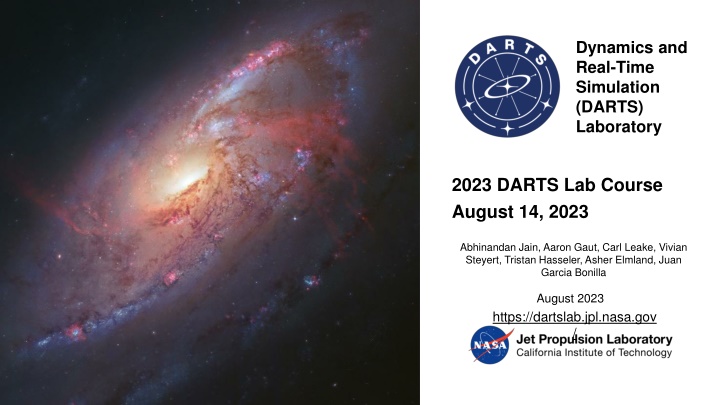
Quadcopter Simulation for DARTS Lab Course
Explore the quadcopter reference problem in the DARTS Lab course, covering topics such as simulation inspection, multibody dynamics, refactoring for reusability, and terrain addition. Learn about foundational capabilities like math libraries, kinematics, and data logging for simulations.
Download Presentation

Please find below an Image/Link to download the presentation.
The content on the website is provided AS IS for your information and personal use only. It may not be sold, licensed, or shared on other websites without obtaining consent from the author. If you encounter any issues during the download, it is possible that the publisher has removed the file from their server.
You are allowed to download the files provided on this website for personal or commercial use, subject to the condition that they are used lawfully. All files are the property of their respective owners.
The content on the website is provided AS IS for your information and personal use only. It may not be sold, licensed, or shared on other websites without obtaining consent from the author.
E N D
Presentation Transcript
Dynamics and Real-Time Simulation (DARTS) Laboratory Quadcopter Reference Problem Part 1 August 14, 2023 2023 DARTS Lab Course Abhinandan Jain, Aaron Gaut, Carl Leake, Vivian Steyert, Tristan Hasseler, Asher Elmland, Juan Garcia Bonilla August 2023 https://dartslab.jpl.nasa.gov/ https://dartslab.jpl.nasa.gov / https://dartslab.jpl.nasa.gov/
Quadrotor reference problem We will use the reference problem of a quadrotor simulation as a concrete example of each component of the DARTS/Dshell framework Topics we will cover: Inspecting an existing simulation Using DARTS for multibody dynamics and component models Refactoring for speed and reusability with Dshell Adding terrain with SimScape And more 2
Inspecting the quadrotor sim For practically any simulation, there are foundational capabilities we will want: A math library to handle rotations, transforms, and so on. A kinematics layer to determine relative frame transforms. A way of accessing and creating simulation variables in a uniform manner. The ability to log simulation data for post-analysis. 3
Inspecting the quadrotor sim For practically any simulation, there are foundational capabilities we will want: SOA Math DFrame A math library to handle rotations, transforms, and so on. A kinematics layer to determine relative frame transforms. DVar A way of accessing and creating simulation variables in a uniform manner. DataRecorder The ability to log simulation data for post-analysis. 4
Inspection notebook (notebook: Quadrotor/01-Inspection) Inspect a complete quadcopter simulation and use foundational libraries to model a tilt sensor 5
